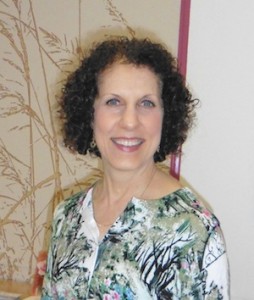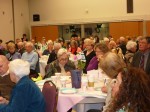It was a capacity crowd at Jewish Senior Alliance’s Spring Forum on May 4. (photo by Binny Goldman)
Gyda Chud, co-convener and current board member of the Jewish Seniors Alliance of Greater Vancouver, as well as an original member of the Peretz Centre for Secular Jewish Culture, enthusiastically welcomed a capacity crowd of 180 to this year’s annual JSA Spring Forum, which took place on May 4 at the Peretz. The theme was “Retired/Rewired.”
Chud acquainted those attending with the philosophy, programs and purpose of JSA and reminded us that life learning leads to the best quality of life. She advocated that we should all be volunteers, saying, “Volunteers are not paid – not because they are worthless but rather because they are priceless.”
Bev Cooper read her poem about how she came up with the word “rewired,” rather than retired. For Cooper, the word “rewirement” has become her cue to search for ways to ride the waves in the difficult times. And, in the more comfortable times, rewirement propels her to use the opportunity to seek out new challenges.
Cooper then called upon Gloria Levi, social worker, consultant in the field of gerontology and co-author of Dealing with Memory Changes as You Grow Older, to be the moderator of the afternoon’s forum. She spoke of her personal connection to JSA and introduced gerontologist Roz Kaplan, director of the seniors program at Simon Fraser University’s continuing studies.
Kaplan said that most people nowadays will live some 30 years after retirement and that we need to prepare for that time. Retirement is not a destiny but a journey for which we should “pack” essentials and, as with all journeys, some of us will be better equipped and prepared than others for the trip.
With the average life span for Canadians now into the 80s, we were encouraged to keep learning: an instrument, a language, dance steps, the means to rise to challenges and accept change.
We were told we needed confidants, connections, community and having a passion. This journey would be a path to opportunity and, as we age, we should divest ourselves of “extra luggage” to enable us to reinvent ourselves. Most of us got through life identifying ourselves with our work, noted Kaplan, and reinvention would allow us a chance to ease into retirement.
The stages of life usually encompass birth, education, work, retirement, death. It is up to us to fill in the gaps with personal growth. Many of us return to an encore career. Family, friends, fitness, travel, volunteering and various hobbies serve to keep us vital. A recommended read was Creating a Healthy Retirement by Dr. Ronald and Lois Richardson.
After a brief question period, Levi introduced speaker John F. Helliwell, an officer of the Order of Canada, a fellow of the Royal Society and senior fellow and co-director of the Canadian Institute for Advanced Research. As a professor emeritus at the University of British Columbia, Helliwell has written articles on “how to build happy lives,” the topic of his talk, and is a co-editor of The World Happiness Report.
We started by singing “If You’re Happy and You Know It.” Helliwell asked if we were any happier after the shared singing than before, and most, if not all, of us were.
How do we measure happiness? Usually this is not a question asked by our doctor or therapist; rather, we are asked if we are sad or depressed or possess negative feelings. Negativity is not only a state of mind but also affects our physical well-being, Helliwell explained.
An example was given of students in a hotel room who were all exposed to the rhinovirus. Those with negative feelings/attitude generally succumbed to the cold germ, whereas those with a positive outlook were much less affected, with some even escaping being sick entirely. It was also suggested that we need to concentrate more on health building rather than health repair.
Economic factors are far less important to happiness than bonds with other people and assisting each other to overcome strife and difficult circumstances. Iceland and Ireland were given as examples of quality of life because the people living there showed, on average, more concern and care for one another.
Aristotle stated that a fine quality of life brings happiness to individuals in a variety of forms but we all agreed on aspects needed for good quality of life: food, health, trust, freedom (to make decisions and feel actively engaged in one’s life) and generosity (doing nice things for others raises one’s own happiness).
Another example offered by Helliwell was of a care home in Denmark, where the staff had been asked to design the home as if they themselves were to be its residents. Their advice was to do away with uniforms for staff, to dispense with bibs and to make mealtimes variable. At one of the homes, the chef even drove the residents to a local movie theatre and they all enjoyed annual holidays together, more like one would expect if one were with close family.
In a residence where there were two floors, one known as generally happy, the other, unhappy, residents on the “unhappy floor” were asked to design the space in which they would be living in a new building and suggestions were made, followed and increased happiness ensued.
In another instance, a seniors residence was combined with a day care, and seniors and juniors interacted happily, all benefiting, a little like symbiosis. No one broke the rules, nobody wandered away searching for the home they had left – they all felt they were home.
During the question period, it was asked why Israelis are happy even though they live such stressful lives. The answer seemed to be that there really is no time for introspection. As well, all are united in the common bond to continue to defend and build their country and that aim/purpose builds happiness.
A last question was about how we can continue to be selfishly happy if many of the rest of the world seems so unhappy. The answer was, “Whose misery is lessened by our being unhappy?”
After summarizing the two speakers’ talks, Levi spoke of JSA president Serge Haber and his countless contributions to the community through the years and of his being one of those honored at the Louis Brier Jewish Aged Foundation’s Eight Over Eighty (on May 25).
Haber asked everyone to rise for a moment’s silence to mark Yom Hazikaron, commemorating fallen soldiers; he pointed out the Israeli flags in the centre of each flower arrangement, celebrating Israel’s Independence Day. As refreshments prepared by Bagel Club Catering were served by JSA volunteers, Haber thanked those who had convened the forum and emphasized that much of this would not have been possible without the efforts of the amazing staff, Karon Shear and Rita Propp. Shear also took a video of the forum, which will appear on the JSA website.
Herb Calderwood, the afternoon’s musical entertainer, handed out songbooks and charmed the crowd by announcing that he may not know all the songs in the book, as he does not read music, but he asked us to call out our request by number. He delighted us as well with a game of “Name That Tune,” and those who guessed the tune were rewarded with a prize. Door prizes further kept the happiness quotient high and the afternoon came to a happy conclusion, as the audience did indeed leave rewired.
Binny Goldman is a member of the Jewish Seniors Alliance of Greater Vancouver board.


